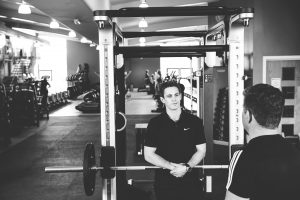- 24th August 2017
- By Matthew Fever

If you have decided to make the commitment and join the gym, well done on taking the first and possibly the hardest step – getting started!
Now that you have decided to make some positive changes, let me share with you my experience and help you avoid some of the mistakes I see all too often on the gym floor.
My aim is to always educate, motivate and give people confidence when working in the gym. If you can avoid the following common errors, you will now doubt find that you waste less time, see more progress, and maintain motivation.
Here are five things that you should avoid with your training.
1: No Plan, No Objective – If you turn up at the gym each week with no idea what the session will look like or how it will help you achieve your goals, you will ultimately experience a lack of progress. The exception to this is the first few weeks. This is known as the ‘Novice Effect’. If you are training for the first time or have been absent for a while, whatever you do for the first few weeks will be effective. Anything is better than nothing! However, your body is rather quick to adapt to new stimulus and if you are to continue making progress, the stress you are placing on your body will need to be carefully managed and gradually increased to produce the best results and avoid injury. Figure out exactly what it is you are trying to do and follow a plan – it doesn’t need to be much more complicated than that. Arranging your life to enable you to stick to the plan will be the complicated part.

2: Doing your own thing and customise programming – You are not the first person to try and lose weight, get strong, or improve your flexibility. The methods required to achieve such things have been tried, tested and well documented over time. Your programme already exists, it’s just hard to find credible sources of information. Take the time to read books, research on the internet or better yet find a coach who has done it and helped others achieve it and can offer you their experience.
Success leaves tracks, somebody has already done it! You don’t need to make it up yourself. Once you find a programme, stick to it and see it through.
As a beginner, you need to master the basics. That’s it. Save the specialist programming for the more advanced athletes. If you have injuries or pre existing medical conditions, again, you will not be the first. Find a good trainer who can work with you and suggest a suitable plan.

3: Too much cardio – Lots of beginners find themselves spending too much time in the ‘cardio’ section of the gym. This is usually because the machines are easy to operate, they feel uncomfortable in the weights room or they are trying to lose weight the only way they know how.
Performing exercises that keep the cardiovascular system healthy is of course important, however usually it needs to be built into a much broader programme that includes mobility and strength training. If you are spending all of your time in the cardio section you are only developing one aspect of your fitness. Take the time to build your strength, challenge your body with new movements and develop some flexibility.

4: Too many exercises – You only need to work on a few exercises at a time. This comes back to mastering the basics. It’s simply better to have a small selection of exercises that you are making progress with compared with a long list of movements to get through each time you train. For example, you don’t need 5 different ways to work your legs, if you’re a beginner, you need to learn to squat. This is more than adequate to develop the strength in your legs. In simple terms, develop the following movement patterns, ideally unsupported without the aid of a machine.
- Squat
- Pressing
- Pulling
- Hip Hinge (Deadlift)
- Carrying
Performing a movement from each category means you are using functional movement that carries over to everyday tasks or sport. You will be using your body as a system, the way it is designed to work – rather than as a collection of body parts.

5: Underestimating whats involved – The fitness industry promotes quick fixes all the time. We are all lead to believe that we can get fit in 15-30 minutes each day, but the reality of it is, it takes much more work and commitment than you think. Balance what you are realistically able to do with what you are hoping to achieve.
If you are following a plan, the schedule will be mapped out for you, detailing exactly what you have to do and what’s involved. Don’t underestimate how much life can get in the way. You will soon realise that there are many things that dominate your time and take priority, this will no doubt be one of your biggest barriers. Consistency is key and routine is essential. This can be more than difficult if you live a busy life.
There are so many things you can do to stay on track and keep motivated. Your biggest form of motivation will come from success. Actual achievements that you will earn in the gym. Nothing will motivate you more than doing well.
I hope this post has been informative, if you’re a little lost at the moment, please get in touch. I’m sure I can help you get to where you need to be and make the time you invest in the gym more productive.
